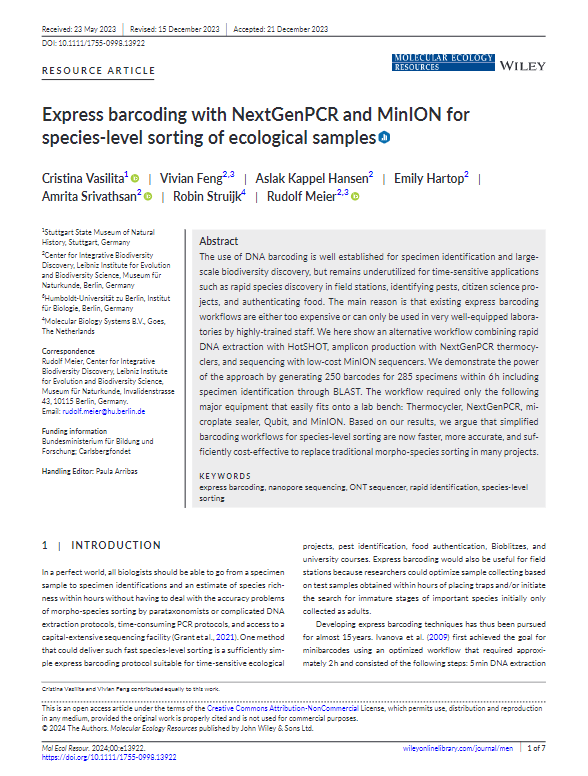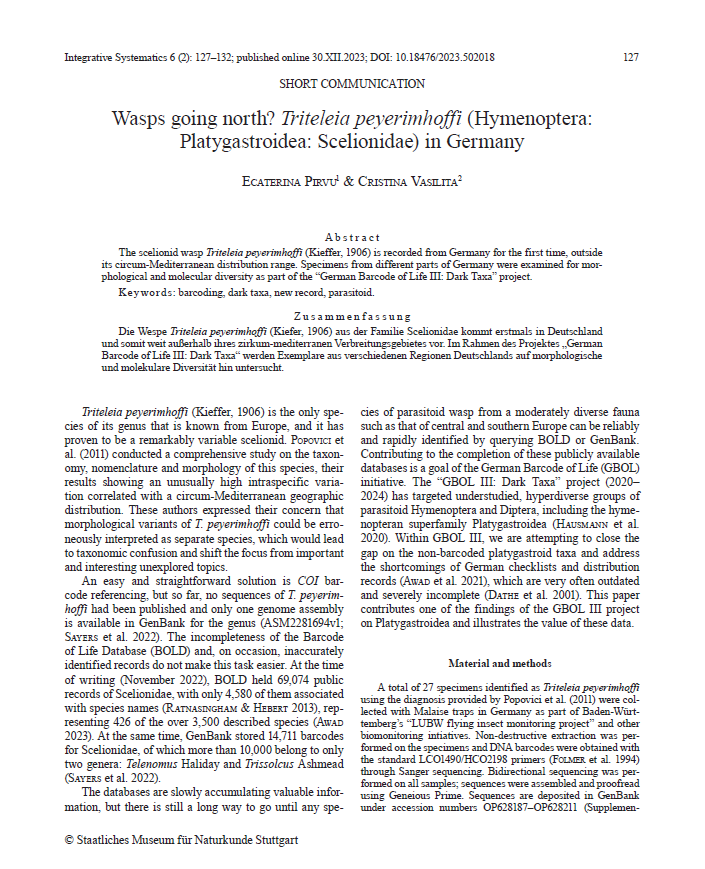New Publication
19.01.2024: Vasilita, C., Feng, V., Hansen, A.K., Hartop, E., Srivathsan, A., & Meier, R.: Express barcoding with NextGenPCR and MinION for species-level sorting of ecological samples.
We here show that by combining the fast cycling of NextGenPCR® with MinION sequencing, one can generate and analyse 250 barcodes in 6 h. All the processes are so robust that they can be learned within days and are suitable for use in university classes. We thus suggest that it is time that many projects replace species-level sorting based on morphology with species-level sorting with DNA barcodes.
Molecular Ecology Resources, 00, e13922. https://doi.org/10.1111/1755-0998.13922

New Publication
30.12.2023: Pirvu, E. & Vasilita, C. : Wasps going north? Triteleia peyerimhoffi (Hymenoptera: Platygastroidea: Scelionidae) in Germany
Triteleia peyerimhoffi is a scelionid wasp with a previously thought circum-mediteranean distribution, recently found in Germany. This is the only species of this genus that occurs in Europe and this is the first time we find it as far north as northern Rheinland-Pfalz. It exhibits high intraspecific morphological variation that could be correlated to distant populations and alternative host species. By providing the first barcodes for the species, we investigated the genetic diversity in correlation to the morphological variability and resolve one more dark taxon, by making verifiable morphological and genetic data available.
Integrative Systematics: Stuttgart Contributions to Natural History, 6(2):127-132 (2023).

‘Verbundbericht 2022’ for GBOL III : Dark Taxa is ready and available
The third ‘Verbundbericht’ for the GBOL III: Dark Taxa project has been completed. The ‘Verbundbericht’ reports the success and progress of the partners in the project for the year 2022. It can be downloaded here (in german language):
New Preprint
19.05.2023: Moore M.R., Talamas E.J., Bremer J.S., McGathey N., Fulton J.C., Lahey Z., Awad J., Roberts C.G., Combee L.A. (2023) Mining biodiversity databases establishes a global baseline of cosmopolitan Insecta mOTUs: a case study on Platygastroidea (Hymenoptera) with consequences for biological control programs. ARPHA Preprints. doi: 10.3897/arphapreprints.e106433

New Publication
09.05.2023: Jafari S., Müller B., Rulik B., Rduch V., Peters R.S. (2023): Another crack in the Dark Taxa wall: a custom DNA barcoding protocol for the species-rich and common Eurytomidae (Hymenoptera, Chalcidoidea) . Biodiversity Data Journal 11: e101998.

New Publication
08.05.2023: Awad, J. Krogmann, L., Talamas, E. (2023): Illuminating a Dark Taxon: Revision of European Trichacis Förster (Hymenoptera: Platygastridae) reveals a glut of synonyms. Zootaxa 5278 (3): 563-577.

New Publication
02.05.2023: Melotto G., Awad J., Talamas E.J., Koch R.L., Lindsey A.R.I. (2023): Synopeas maximum Awad & Talamas (Hymenoptera, Platygastridae): a new species of parasitoid associated with soybean gall midge, Resseliella maxima Gagné (Diptera, Cecidomyiidae). Journal of Hymenoptera Research 96: 181-205.
https://doi.org/10.3897/jhr.96.102865

New Preprint
29.04.2023: Vasilita, C., Feng, V., Hansen, A. K., Hartop, E., Srivathsan, A., Struijk, R., Meier, R. (2023): Express barcoding with NextGenPCR and MinION for species-level sorting of ecological samples

New Publication
27.04.2023: Moser, M., Ulmer, J. M., van de Kamp, T., Vasilița, C., Renninger, M., Mikó, I., & Krogmann, L. (2023). Surprising morphological diversity in ceraphronid wasps revealed by a distinctive new species of Aphanogmus (Hymenoptera: Ceraphronoidea). European Journal of Taxonomy, 864(1), 146-166. https://doi.org/10.5852/ejt.2023.864.2095

3rd GBOL III: Dark Taxa Workshop
23.03.2023: The 3rd GBOL III: Dark Taxa Workshop for the PhD candidates was helt at the Museum Koenig Bonn. During three days and beyond we were dealing with “Writing a joint synoptic conceptual paper “. An exciting challenge – one that everyone from our project will be involved in sooner or later.

From the media
15.03.2023: “They live right in front of our eyes, yet hidden from view. Mostly they are inconspicuous or so small that they cannot be distinguished from each other without optical aids.” The article “Unknown Diversity” begins with these words, where Spektrum der Wissenschaft reports on GBOL III: Dark Taxa (article in German). Link

From the media
14.11.2022: the Livestream of Breaking Lab by Jacob Beautemps took place in the savannah at the LIB – Museum Koenig Bonn. This livestream was created in cooperation between Breaking Lab and the eight Leibniz research museums as part of the action plan “One World on the Move”. The action plan is funded by the Federal Ministry of Education and Research and the federal states in which the research museums are located. The stream was about biodiversity and the related research areas. The focus is on undiscovered species – so-called “dark taxa”. In this context, we take a closer look at some insects and look at so-called metabarcoding to determine species in a habitat based on their DNA. The record is available via YouTube.

Annual Meeting 2022
07.11.2022: A great Annual Meeting of the GBOL III: Dark Taxa consortium took place in Bonn at the LIB – Museum Koenig Bonn. For the first time at all, we met in person. It was a pleasant opportunity to learn more about each other and the various subprojects. We are looking forward to our next steps in GBOL III: Dark Taxa

Treasures
21.10.2022: Have you seen this yet? One of “our” parasotoid wasps, Aspicera forshzarai, is #TreasureoftheMonth of the LIB.

#AchtungArtenvielfalt
19.10.2022: During the FEdA #AchtungArtenvielfalt action week, performing a popular scientific talk and a tour behind the scenes, Björn Rulik, Jana Thormann & Vera Rduch gave insights into DNA barcoding, the GBOL project, insect diversity and Dark Taxa, shown in the collection using the example of scuttle flies, the Phoridae

New Publication
23.08.2022: We presented the ASV Table Registry for metabarcoding at the TDWG 2022 conference. The abstract is available here: Bräunig, Quast, Grobe (2022): Bridging a Gap in Metabarcoding Research: The ASV Table Registry. Biodiversity Information Science and Standards 6: e91504.
https://doi.org/10.3897/biss.6.91504

‘Verbundbericht 2021’ for GBOL III : Dark Taxa available
The second ‘Verbundbericht’ for the GBOL III: Dark Taxa project has been completed. The ‘Verbundbericht’ reports the success and progress of the partners in the project for the year 2021. It can be downloaded here (in german language):
New Publication
21.04.2022: Jaume-Schinkel et al.: “Alepia viatrix sp. nov. ( Diptera: Psychodidae), a new species of a Neotropical genus found on the Azores Archipelago (Portugal)” Zootaxa 5128 (3): 384–396 describes a new species and includes an identification key for the adult male Psychodidae species recorded on the Azores Archipelago. https://doi.org/10.11646/zootaxa.5128.3.4

New Publication
07.12.2021: A new paper presents results gained within GBOL III: Dark Taxa. Haas et al. (2021): Tiny wasps, huge diversity – A review of German Pteromalidae with new generic and species records (Hymenoptera: Chalcidoidea). Biodiversity Data Journal 9: e77092. https://doi.org/10.3897/BDJ.9.e77092

Annual Meeting of the Consortium 2021
22./23.11.2021: Once again, our annual meeting of the consortium took place only virually. However, colleagues, partners and external experts from outside the consortium were able to participate without having to travel to the meeting. Presentations from the consortium, the PhD candidates and the subprojects gave an insight into the status of the work and first results.

Broadcast “Heimatflimmern”
28.10.2021: The documentary about the Museum Koenig in Bonn was broadcasted on WDR at prime time. Also the work within GBOL III: Dark Taxa was shown. Available in the media library: https://tinyurl.com/3typjt72

New Publication
11.10.2021: GBOL researchers discover Platystasius transversus, an odd little wasp that parasitizes eggs of a rare beetle. A new genus and species record for Germany, photographed and DNA barcoded for the first time. Award et al. (2021): The rare beetle egg parasitoid Platystasius transversus (Thomson) (Hymenoptera: Platygastridae: Sceliotrachelinae), a new genus and species record for Germany. Insecta Mundi
0886: 1–5. Link: https://journals.flvc.org/mundi/article/view/129681

New Publication
09.09.2021: Using a combination of GBOL data and historical specimens, four genera and 11 species of Scelionidae (Hymenoptera: Platygastroidea) are reported from Germany for the first time, with DNA barcodes and updated distributions. Award et al. (2021): New records of German Scelionidae (Hymenoptera: Platygastroidea) from the collection of the State Museum of Natural History Stuttgart. Biodiverstiy Data Journal 9: e69856. Link: https://bdj.pensoft.net/article/69856/

First ‘Verbundbericht’ for GBOL III : Dark Taxa completed
In the last days of April we completed the first ‘Verbundbericht’ for the GBOL III: Dark Taxa project. The ‘Verbundbericht’ reports the success and progress of the partners in the first six months of the project. It can be downloaded here (in german language): Download Verbundbericht.
Reporting about GBOL III: Dark Taxa
29.04.2021: Away from daily routine: a TV crew filming a documentary about the Museum Koenig joined our field trip and will also be reporting about GBOL III: Dark Taxa. We will keep you posted about the broadcast date.

Reporting about über Dark Taxa
23.04.2021: What are Dark Taxa? And why is it so important to learn more about them. Here is a nice article (in German) with an image gallery that tells you more about Dark Taxa (and about our project GBOL III: Dark Taxa). Link: https://tinyurl.com/BrWissenDarkTaxa

Reporting about GBOL III: Dark Taxa
13.03.2021: Why we are still discovering new species? And what is the difference between discovering and describing new species? Prof. Dr. Bernhard Misof, director at the Zoological Research Museum Alexander Koenig, & Dr. Ralph S. Peters, project leader of GBOL III: DarkTaxa, among others are acting as interlocutors in this episode of Funkkolleg “Mensch und Tier” (in German). Link: https://tinyurl.com/FunkkollegTierarten

Pipeline for Publications
03.02.2021: Publication and communication of results is an important part of you project. One publication pipeline is via the GBOL III: Dark Taxa dynamic article collection of Biodiversity Data Journal: https://bdj.pensoft.net/topical_collection/65/

New Publication
16.12.2020: A popular scientific article (in German) about the tasks and goals of GBOL III: Dark Taxa was published in the Koenigiana, the journal of the Alexander Koenig Society. Link: https://tinyurl.com/GBOLIIIDarkTaxaKoenigiana

New Publication
17.12.2020: A new paper using GBOL data was published: A revision of European species of the genus Tetrastichus (Hymenoptera: Eulophidae) using integrative taxonomy. Link: https://bdj.pensoft.net/article/59177/

Kick-Off Meeting
Let’s do GBOL III: Dark Taxa! Our virtual Kick-Off Meeting for the new phase of GBOL took place on 6th October 2020. You could feel the motivation and enthusiasm throughout the whole day and among all participants to put the Dark Taxa “on the map”. Like the previous phases GBOL III: Dark Taxa is funded by BMBF.

GBOL III: Dark Taxa in the local newspapers
19. August 2020 – GBOL III: Dark Taxa in the local newspapers: We illuminate unknown beings. Why we expect detecting a lot of new species in the middle of Germany and how we will bring light into the darkness. Link: https://tinyurl.com/GADarkTaxa

1 July 2020
The new German Barcode of Life project, GBOL III: Dark Taxa was launched and is funded by a 5.3 million Euro grant from the German Federal Ministry of Education and Research (BMBF). The project will address a range of questions related to the part of the German fauna that is still largely unknown, and comprises the so-called “Dark Taxa”, in particular Diptera (flies and midges) and parasitoid Hymenoptera (parasitoid wasps). Three major natural history institutions in Bonn (Zoological Research Museum Alexander Koenig), Munich (Bavarian State Collection of Zoology) and Stuttgart (State Museum of Natural History Stuttgart), and the University of Würzburg, will tackle the taxonomy of Germany’s “Dark Taxa” using an integrative taxonomic approach. The Entomological Society Krefeld further joins the consortium.



